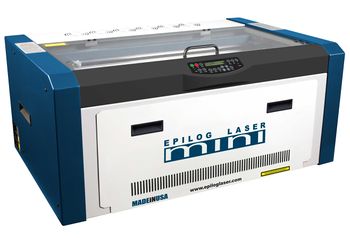Epilog Mini 24: Difference between revisions
m →Available Accessories: removed link |
m →Available Accessories: adding link |
||
| Line 33: | Line 33: | ||
=== Rotary attachment === | === Rotary attachment === | ||
The Rotary Attachment allows you to engrave wine bottles, mugs, glasses, rolling pins, flashlights and more. | The Rotary Attachment allows you to engrave wine bottles, mugs, glasses, rolling pins, flashlights and more. [https://www.flickr.com/photos/fablab-reykjavik/albums/72157667331149715 view examples] | ||
== Laserable materials == | == Laserable materials == | ||
Revision as of 14:38, 19 April 2016
English • Deutsch • français • español • íslenska • 日本語 • Nederlands • norsk • galego • føroyskt • Türkçe •

Overview
The Epilog laser is a cutting and engraving machine. You can work with various materials such as wood, acrylic glass or cardboard. You will need to prepare a vector graphics file in the shape you want to cut and/or engrave. This machine can take material maximum size of 60 by 30 centimeters. Any vector design file needs exported to PDF file format. The machine does not cut metal, though it can engrave certain coated metals.
Technical specifications
| Epilog Mini 24 | |
|---|---|
| Engraving Area | 24" x 12" (610 x 305 mm) |
| Maximum Material Thickness | 5.5" (140 mm) |
| Maximum Material Thickness with Table Removed | 8" (203 mm) 23.5" x 11.75" (597 x 298 mm) engraving area. |
| Laser Wattage* | 30, 40, 50, or 60 watts |
| * 40 Watts is the default in Fablabs | |
Available Accessories
Rotary attachment
The Rotary Attachment allows you to engrave wine bottles, mugs, glasses, rolling pins, flashlights and more. view examples
Laserable materials
| Engrave | Cut | |
|---|---|---|
| Wood | x | x |
| Acrylic | x | x |
| Fabric | x | x |
| Glass | x | |
| Coated Metals | x | |
| Ceramic | x | |
| Delrin | x | x |
| Cloth | x | x |
| Leather | x | x |
| Marble | x | |
| Matte Board | x | x |
| Melamine | x | x |
| Paper | x | x |
| Mylar | x | x |
| Pressboard | x | x |
| Rubber | x | x |
| Wood Veneer | x | x |
| Fiberglass | x | x |
| Painted Metals | x | |
| Tile | x | |
| Plastic | x | x |
| Cork | x | x |
| Corian | x | x |
| Anodized Aluminum | x | |
| Stainless Steel | * | |
| Brass | * | |
| Titanium | * | |
| Bare Metals | * | |
| * CO2 lasers will mark bare metals when coated with a metal marking solution. | ||
Machine Usage
Portal:Safety: NEVER let the laser machine operate unattended. Many materials have the potential to suddenly burst into flames.
How to prepare a vector file PDF
- for cutting shapes: set all vector lines to line width 0.01 mm
- document needs to be on RGB color setting (not CMYK)
- when using text, outline the font (use union to join the shapes)
Tutorials
- Inkscape: Quick start guide
- Inkscape: How to convert an image to vector
- Inkscape: How to make a pressfit design (offsetting lines)
- Icelandic: Leiðbeiningar fyrir Epilog laser
- Icelandic: Leiðbeiningar fyrir rotary attachment
Tips
- vector (cutting): put the design in outlines (no fill's).
- rastering (engraving): put the design in fill's (no outlines).
- you can highlight your engraving by adding paint. Read more at: user project or YouTube Color Engraved Items.
- good user documentation om making rubber stamps: Lasercut_linoleum_stamps





